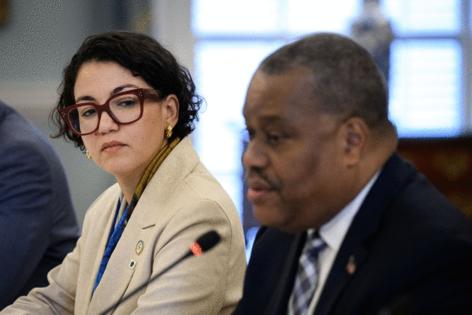Demand to fire Haiti's foreign minister triggers standoff inside US-backed transition
Published in News & Features
Haiti’s delicate relations with the Dominican Republic are igniting tensions inside the government, with members of the ruling presidential council demanding the firing of the country’s foreign minister, Dominique Dupuy.
Believing Dupuy’s stance toward the Dominican Republic over its mass deportations of Haitians is too harsh, presidential council members on Tuesday called on Prime Minister Garry Conille to fire her, saying they no longer trust her. Council members later approved a resolution to remove Dupuy from her post.
Conille has refused the request, leading to a standoff with the Transitional Presidential Council in what has been an uneasy relationship.
Council President Leslie Voltaire told Conille the council has the necessary votes and the authority to fire Dupuy. Members also warned they would not participate in meetings of the country’s council of ministers until she is gone, two sources familiar with the discussions told the Miami Herald. A meeting scheduled for Wednesday was canceled, but Conille plans to meet with his cabinet and plans to ask it to adopt a resolution condemning the Dominican Republic’s decision to deport up to 10,000 Haitians a week as “xenophobic, racist and discriminatory.”
It’s unclear who actually has the ultimate authority to fire the minister. Haiti does not currently have a sitting parliament, which usually has the authority to fire a minister. Complicating the issue, procedural rules governing the transition have been repeatedly changed to accommodate the different majorities on the presidential council since it was formed on March 11.
During Tuesday’s meeting, Conille, according to a source, pulled out a copy of Haiti’s 1987 Constitution and slid it toward Voltaire. The prime minister then proceeded to cite the separation of powers between the presidency and his office, telling Voltaire and the rest of the council he doesn’t see where they have the right to fire one of his ministers and he would do no such thing.
Conille said Dupuy, “has done an incredible job for Haiti.” He then listed some of her recent accomplishments, including acquiring ammunition and guns from Brazil for the Haitian army; persuading the United Arab Emirates to increase its contributions to help the country, and her recent efforts to rally international support against the Dominican Republic’s forced deportations of Haitians.
“She is extremely well liked and respected,” Conille said, adding that he was very happy with her.
The council refused to back down, and Voltaire told Conille that “the decision has been made; there is no discussion. We’ve decided.” He also accused Dupuy of “treason.”
Voltaire was joined in his criticism by three council members who have been accused of corruption in a recent bribery scandal. Absent from the discussions were Laurent Saint-Cyr, the representative of the private sector, and former Sen. Edgard Leblanc Fils, the former head of the council who has refused to participate in meetings after criticizing the panel for refusing to get rid of the members accused of corruption.
This marks the second time that Voltaire has sought to remove Dupuy since her appointment four months ago. His first attempt came on the heels of the U.N. General Assembly meeting in New York, during which he was twice refused access to meetings after Leblanc’s arrival was delayed.
Dupuy was initially tapped to join the nine-member Transitional Presidential Council earlier this year, but withdrew her name, citing threats against her and her family. This time around, however, she is showing no signs of quitting despite the pressure.
“It’s unfortunate that in the midst of such a dire humanitarian crisis... the highest power of the executive would be spending time trying to target me as a member of government for no official reason that has been communicated to me yet,” Dupuy told the Miami Herald.
“I remain open to dialogue and collaboration with any and every official in this transition for us to succeed for the benefit of the Haitian people,” she said late Tuesday while traveling back to Port-au-Prince from a meeting in Paris. “I’ll always be on the front line of every effort that has the interest of the Haitian people at its core.”
Neither Voltaire nor an aide to Conille responded to a Herald request for comment.
Last week, Dupuy called for an emergency meeting of the Organization of American States’ Permanent Council at which Haiti’s representative accused the Dominican Republic of employing “a strategy of ethnic cleansing.” While some have applauded the stance, others are uneasy.
There is also the matter of whether Haiti’s foreign policy should be in the hands of the prime minister or the presidency.
After the foreign ministry issued an internal memo meant as talking points for Haiti’s diplomats on the government’s stance on the Dominican government’s deportation policy, Voltaire issued his own memo on behalf of the presidential council to foreign ambassadors in Port-au-Prince.
The ministry’s memo, signed by its director general and distributed throughout Haiti’s embassies and consulates, said that “the Haitian State strongly condemns the massive deportation and dehumanizing violations of the rights of tens of thousands of Haitian immigrants by Dominican authorities.”
The one that Voltaire issued five days later took a softer tone as it laid out the tensions and opened by describing the relations between the two neighbors sharing the island of Hispaniola as “already very complex and difficult.”
©2024 Miami Herald. Visit at miamiherald.com. Distributed by Tribune Content Agency, LLC.







Comments